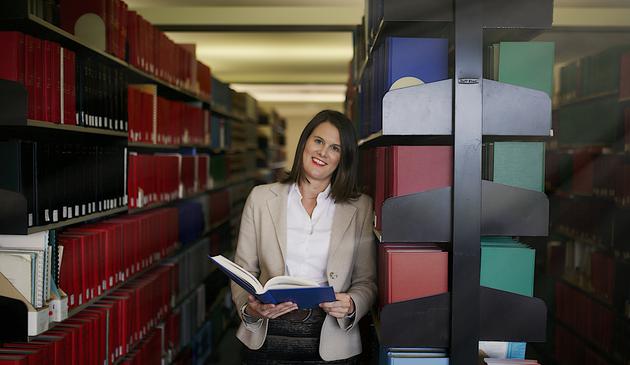Being woken up by gunfire almost every night in Rwanda and speaking to survivors of systemic genocide are just some of the many formative experiences of University of Tasmania Law School alumnus Dr Alice Edwards.
Getting to where she is now, the Head of the Convention Against Torture Initiative (CTI) in Geneva has not been without challenges and hurdles, which she has overcome with sheer determination and lessons learnt.
“I would describe my career as going in and out of research academia and as a legal practitioner rather than as an academic lawyer,” Dr Edwards said.
“One of the things that has kept me going in this work is around having met the victims of the Srebrenica massacre, where they lost their husbands and sons.
“For those women nothing, of course, would bring back their husbands and sons and other family members, but they were committed to finding justice.
“I think for me that massacre, which is the largest massacre since World War 2 in Europe, and the fact that it was in Europe, resonates, and I think about it often.”
Dr Edwards conducted a major study for the United Nations High Commissioner for Refugees during that time, which has influenced the approaches to women victims of violence and conflict.

Refugee camp. source: UNHCR
Coping with the enormity of the work
“This type of work is not for people that are faint of heart. It does require a certain ability to separate your emotions from what is going on, and to be able to make spot decisions. It takes quite a lot of emotional intelligence,” she said.
“When I first started, I would wake up at night with lists of things that I needed to do in order to make sure a young girl in the camp would be reunited with her family. There's a great sense of responsibility that people relied on you. But over time you still have that sense of responsibility, but you're able to place it in its right place so that you can cope.
“Of course some people are not able to cope as well, and I don't think you know that until you experience it.
“One thing I do know now is that I am remarkably calm under pressure, but I didn't know that before.”
Treat everyone equally
A mantra that Dr Edwards follows religiously is to treat everyone equally regardless of the person’s stature in society or in an organisation.
“One thing I do - one rule I apply is that regardless of whether you're a head of state, whether minister of foreign affairs or whether you are the person following the minister of foreign affairs, is that everybody should be treated equally.
“I think it's important to know that everybody deserves equal respect but also more strategically, you never know who has influence.
“So, if you treat everybody well they will remember that. You just never know who has the ear of the prime minister.
“Regardless of people's levels I think it's important that everybody - simply because they are human beings, but also on the more strategic side -that everybody has a value.”
Learn to be diplomatic
Being in the international scene and having diplomatic skills has proven to be a great asset.
“Australians are not known for their diplomatic skills, nor are lawyers.
“I've had to fine tune those over time and learn from others as to how to be not always so direct, which I think is more natural for me than to be more diplomatic.
“Relationships and diplomacy are built on personal relationships. It's also important to stay grounded when you are in difficult situations, to be able to put everything in its proper context.”
Why study Law at the University of Tasmania?
“I've taught at the University of Oxford and the University of Nottingham, both law schools in the UK. They're in the top four for research and for student experience out of 80 law schools in the country (United Kingdom), and I've also taught at the University of Tasmania, at this law school - and the top law students at this school are equal to any top law student around the world.
“I think the skills and the diligence with which the staff teach students here make this easily equal to the teachings that are - if not better at times - than that in the top law schools.
“I do think it's a small law school but I think it's a brilliant law school.”
Interested in studying Law at the University of Tasmania?
Visit: http://www.utas.edu.au/courses/study/law for more information.
If you are interested being a legal expert providing legal advice without stepping into a courtroom than the Bachelor of Legal Studies would be perfect for you.
Don't let your ATAR define your future
Contact the Law Faculty and speak to one of our advisers to see how we can help you transition to our Law program by providing you a clear and planned pathway to achieving your goal.

